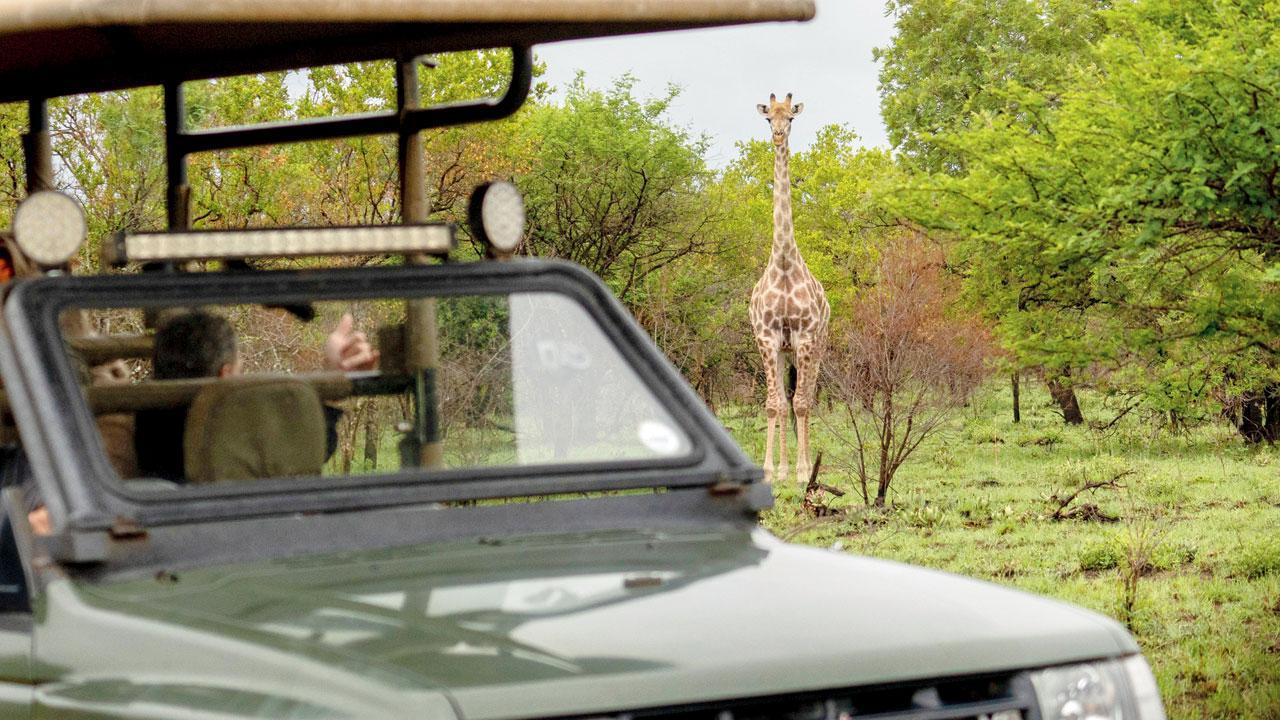South African President Cyril Ramaphosa has criticized the travel bans imposed by Britain and many others, as ‘hypocritical, harsh and not supported by science’

Tebogo Masiu, and Smagele Twala are greeted by a giraffe during a game drive in the Dinokeng game reserve near Hammanskraal, South Africa. Pic/AP
Recent travel bans imposed on South Africa and neighboring countries in response to the discovery of the omicron variant in southern Africa have hammered the country’s safari business, already hard hit by the pandemic.
ADVERTISEMENT
South Africa’s tourism industry suffered a more than 70% drop in foreign tourists in 2020, with Covid-19 blamed for the drop from about 15 million visitors in 2019 to less than 5 million in 2020. Tourism employs about 4.7% of South Africa’s workforce.
Britain, the largest source of tourists to South Africa, lifted its “red list” travel restrictions on South Africa in October and safari operators were beginning to see an improved outlook for the holiday season and 2022. But then the news of omicron struck, bringing a new round of international restrictions on flights.
South African President Cyril Ramaphosa has criticized the travel bans imposed by Britain and many others, including some African countries as “hypocritical, harsh and not supported by science.” He denounced the restrictions as “travel apartheid.” South African safari lodges are experiencing cancellations and few new reservations, said Fred Plachesi, owner of the Tamboti Bush Lodge in the Dinokeng Game Reserve, north of the Tshwane metropolitan area, which includes Pretoria.
With only four guests over the weekend, Plachesi said his business is feeling the damage. He believes the travel bans imposed on South Africa are unfair and will have a negative impact on the people of South Africa. “I really think it’s very unfair for the country ... it’s the South African people and businesses and that suffer,” said Plachesi. He hopes that many countries will reconsider their flight bans and allow travel to and from South Africa again.
UK’s pre-departure Covid test rules in force
Any travellers arriving in the UK from overseas, including India, have to take a COVID-19 pre-departure test no sooner than 48 hours before their journey, under new rules in force from Tuesday aimed at slowing the spread of the Omicron variant. British and Irish citizens returning from the UK’s red list travel ban countries – Angola, Botswana, Eswatini, Lesotho, Malawi, Mozambique, Namibia, Nigeria, South Africa, Zambia, Zimbabwe – are required to hotel quarantine in a government-approved facility.
‘Findings have implications beyond Covid’
 A Christmas tree made of 19,000 empty vaccine containers at a vaccination center in Bucharest. PIC/AP
A Christmas tree made of 19,000 empty vaccine containers at a vaccination center in Bucharest. PIC/AP
Following up first doses of the AstraZeneca or Pfizer vaccines with second doses of Moderna or Novavax jabs generates robust immune response against COVID-19, according to a study published in The Lancet. “Thanks to studies such as these, we are now getting a more complete picture of how different COVID-19 vaccines can be used together in the same vaccine schedule,” said Matthew Snape, Associate Professor, the University of Oxford. “Encouragingly, all these schedules generated antibody concentrations above that of the licensed and effective two dose Oxford-AstraZeneca schedule,” said Snape. When it comes to cellular immunity, the researchers said, having a first dose of AstraZeneca followed by any of the other study vaccines generates a particularly robust response. They said the findings have implications beyond Covid-19 and will inform new approaches to immunisation against other diseases as yet not vaccine preventable.
5,31,156
No. of new cases reported globally in the past 24 hours
26,51,94,191
Total no. of cases worldwide
5,254,116
Total no. of deaths worldwide
Source: WHO/Johns Hopkins
This story has been sourced from a third party syndicated feed, agencies. Mid-day accepts no responsibility or liability for its dependability, trustworthiness, reliability and data of the text. Mid-day management/mid-day.com reserves the sole right to alter, delete or remove (without notice) the content in its absolute discretion for any reason whatsoever
 Subscribe today by clicking the link and stay updated with the latest news!" Click here!
Subscribe today by clicking the link and stay updated with the latest news!" Click here!







